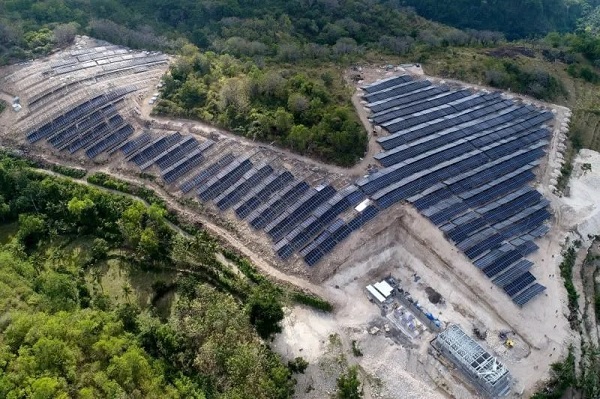Sung Y. Kim (The Jakarta Post)
Jakarta ●
Mon, April 3, 2023
In February, alongside several Indonesian government counterparts and our international partners, I had the honor of participating in the launch of Indonesia’s Just Energy Transition Partnership (JETP) Secretariat.
This new mechanism builds on the landmark JETP joint statement announced in Bali during the Group of 20 Leaders’ Summit in November 2022, where leaders from International Partners Group (IPG) countries, co-led by the United States and Japan, including Canada, Denmark, the European Union, France, Germany, Italy, Norway and the United Kingdom, launched a partnership in support of ambitious new targets for Indonesia’s power sector transition away from fossil fuel and toward renewable energy. The JETP Secretariat, led entirely by Indonesians, will guide an initial commitment of over Rp 300 trillion (US$20 billion) in public and private financing over the next three to five years to achieve these targets.
What will this mean for Indonesia and its citizens? Let’s consider JETP word by word.
Just. First and foremost, this initiative and its financial mechanisms will be just and fair, with significant and durable benefits to Indonesia. Indonesia’s ownership of its energy transition is a key component to achieving its goals to reduce greenhouse gas emissions from the energy sector and ensure affordable clean energy and air for all Indonesians.
Just also means supporting Indonesia’s workforce as it gradually transitions to the renewable energy sector, adding skilled labor in the wind, solar, geothermal and other clean technology industries. These jobs will require more training but will also be higher paid. In other countries, similar transitions have resulted in an increase in the energy sector and related support jobs. Indonesia has already begun to analyze the new skills its workforce will require and JETP partners have committed to work with Indonesia in this endeavor.
To ensure maximum accountability and transparency, the JETP is designed to include civil society organizations and independent subject matter experts so that a wide array of Indonesian perspectives can be considered in every step of the JETP process. Time and again, studies and experience have shown that when development is deliberately inclusive, it is more sustainable, and the impacts are more significant and long-lasting.
Energy. Indonesia’s economy is powered by the brilliant ingenuity of its people and the incredible beauty and biodiversity the country has to offer. The country is currently reliant upon fuel sources that pollute the air, water and land on which so many Indonesians depend for their economic livelihood. Global measurements of greenhouse gas emissions consistently place the energy sector as a top contributor, and Indonesia is no different.
For Indonesia to achieve its goal of becoming a developed country in the next 20 years, it will need to provide power to its citizens through a national grid fueled by renewable energy. A transition to clean energy will allow the economy to grow, innovation to prosper and people to breathe clean air. Globally, corporations are increasingly mandating clean energy as a requirement in their business models, and the JETP will position Indonesian businesses as partners of choice on that basis.
Transition. The US, Indonesia and the wider Indo-Pacific are increasingly and inexorably intertwined. The intersections of health, security and economic matters, and the rapidly advancing frontier of clean energy, are increasing, and our old ways of thinking about these issues simply must modernize. That is especially apparent when we consider the urgency of the climate crisis and the array of possible solutions.
We now understand just how much damage fossil-fuel dependence has done to our global climate, backed by incontrovertible and extensive scientific research. JETP investments will help jumpstart Indonesia’s innovation in energy production, leaping ahead of the old ways of industrialization to build a cleaner, healthier economy powered by renewable energy that does not also damage the archipelago’s beautiful and abundant, though not infinite, natural resources.
Partnership. This is truly the heart of the initiative. Many of the nations involved in this partnership have experienced both the benefits and challenges of a shift to renewable energy, and Indonesia will be able to tap into the experiences of its partners.
Indonesia’s just energy sector transformation requires many partners and tools. The JETP Secretariat is a place where these come together in service of our shared commitments. The Indonesian-led Secretariat combines people with technical knowledge of the unique challenges of the renewable energy transition with subject matter experts who have worked for years to address similar problems. Through this melding of local and international cooperation, the JETP will help Indonesia achieve the energy transition goals it has set for itself.
Just. Energy. Transition. Partnership. The JETP means tackling the climate crisis through industrial innovation to create well-paid green jobs while looking out for all parties affected by the energy transition. The JETP gives Indonesia a groundbreaking way to collaborate with the US and the IPG members for sustainable, financially sound progress toward both climate and economic goals.
This long-term cooperation will accelerate Indonesia’s just power sector transition away from fossil fuels to clean sustainable energy sources, consistent with keeping the 1.5-degree Celsius global warming limit within reach. From adding new and better jobs in the energy sector to promoting cleaner air and reduced greenhouse gas emissions, this initiative benefits everyone.
***
The writer is the United States ambassador to Indonesia.
Disclaimer: The opinions expressed in this article are those of the author and do not reflect the official stance of The Jakarta Post.
